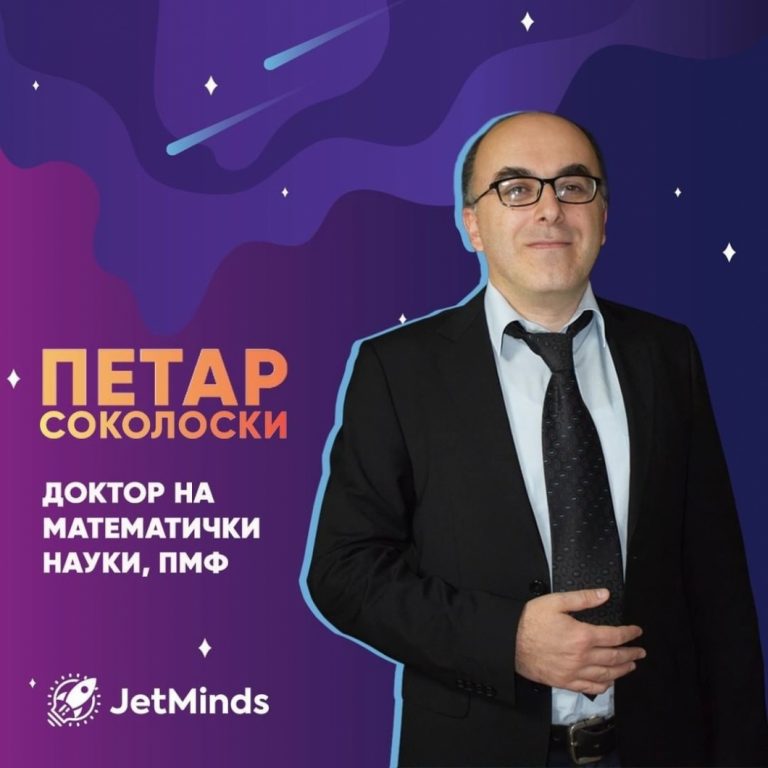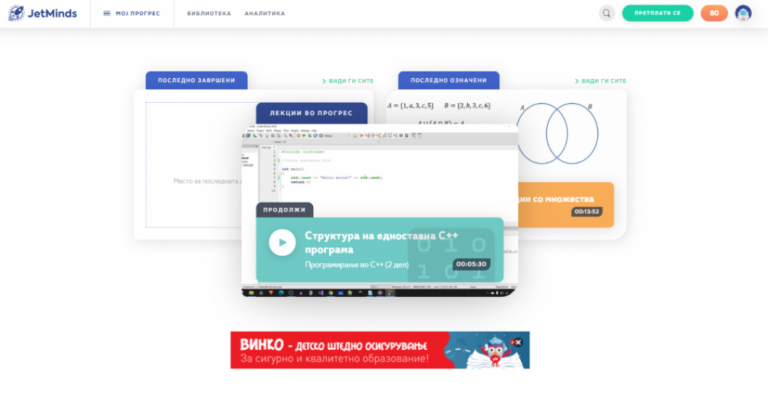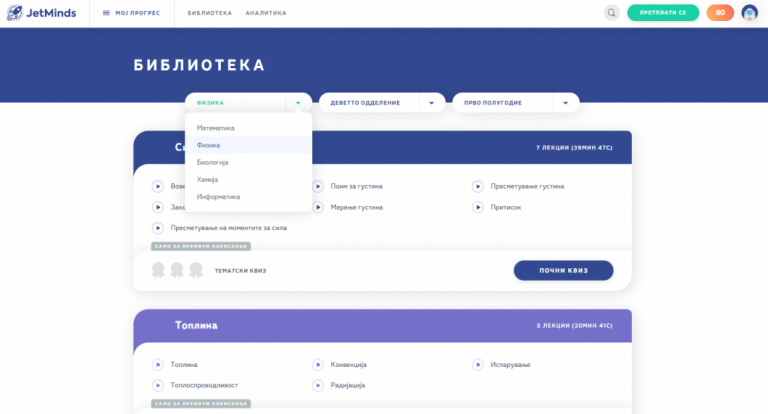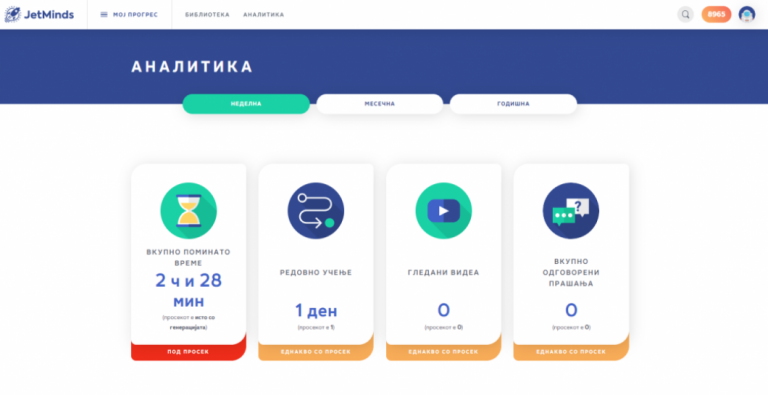Jetminds - the first digital educational platform in the country that provides quality educational materials
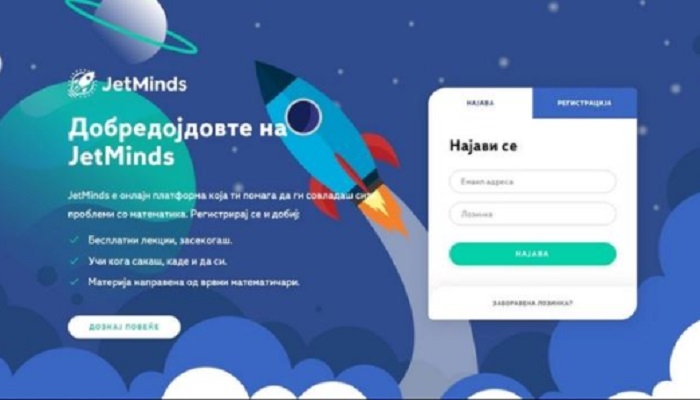
Following the outbreak of the coronavirus, the Jetmindes team offered their education platform to the Ministry of Education free of charge, but received no response, nor were they contacted, but said that it was not transparently chosen to build the current National Platform. On the other hand, their cooperation with the Innovation Fund continued. The Jetminds team says it remains at the disposal of the Department of Education.
For the quality of our education, the classic before the pandemic, but also for the online learning, which was imposed as a necessary anti-crisis measure, for the need for private lessons that are a luxury for most families, and for their contribution to education in the country through the JetMinds platform. which is mostly free for users, and was created with the support of FITD, we talk to Stefan Jovanovski, the head of Sigmoid / JetMinds.
Due to the pandemic, this school year is mostly about distance learning, online learning. Your JetMinds platform (JetMinds.org) has been operating since 2019 when there was still no need for this type of learning. How did you “launch” yourself in the market? What is the interest for the platform, ie how many users are there?
– True, we have been working on Jetmines since 2017. We started with a functional prototype, and to our surprise we received support from the Innovation Fund a little later in 2018. Sure, it was a big springboard. The team expanded to 20 people, including university professors, senior specialists from the Bureau for Development of Education, but also young graduates from FINKI / PMF and other faculties. So, we created a hybrid between experience and innovation in terms of the educational materials we developed.
The material itself was developed gradually, ie usually with four or five versions for each lesson, all in order to ensure that there is no compromise between the quantity and quality of the lessons.
Jetmines officially launched in December 2019. By March 2020, we already had more than 10,000 active users.
When the Covid-19 crisis erupted, we were the only platform in the country that was fully operational. We also responded to the call of the state to contribute to solving the problem, so that in mid-March 2020 we opened the system free of charge for all students.
During this time thousands of children studied at the Jetminds when there was no shortage of alternatives. So, we consider that it is a good example of a startup product, ie a startup product supported by FITD, which still proved to be successful from the very beginning.
At the same time, we would like to emphasize that in that period we had sent an offer to the Ministry of Education in which we undertook to serve the Macedonian market for free as long as the crisis lasts.
However, there was no response from the cabinet of the then minister. On the contrary, it was decided to develop a new platform. A contractor was selected in a rather non-transparent manner, without any announcement or tender. Everyone saw the results. Lessons were made quickly, the copyrights of the professors were abused, reactions from some embassies due to the use of unlicensed software, as well as funds spent by the Macedonian taxpayers, which are still not clear how much they amount to. We believe that some of the state institutions have failed here.
We must be honest, in the whole process we had constant support from the Innovation Fund, through marketing campaigns, organizing informal meetings…
For example, in neighboring Bulgaria, instead of nationalizing the market as in our country, the state supported a local startup company (ucha.se), which today at its expense managed to expand in Romania. That company today employs more people, with higher wages and pays more tax.
Where does the idea for the platform come from, how does it work, is it up to date with the official educational program in the country?
– The idea for Jetmines came very naturally… I used intensive platforms like Coursera and edX during my postgraduate studies in statistics in Skopje. So, even though I studied at UKIM, I still had the opportunity to be up to date online with the latest technologies through lectures from some of the best universities in the world such as Stanford, MIT, Harvard, etc. The skills I gained primarily on these platforms, rather than in full-time study, enabled me to continue working as a data scientist at the headquarters of Societe Generale in Paris. Purely from a perspective, it is about 2014/5, when the topic was not relevant at all in Macedonia.
A few years later, we talked to the other founders about how the education system was failing, especially STEM subjects like math and how parents are forced to send their children to private lessons if they want to get results.
Hence the idea to try to create a platform where every child can get the experience they would have in a private class, for each subject from school, but also in their mother tongue and the official school curriculum.
As I said, we launched in December 2019 and during the winter semester in 2020 the platform was actively used by just over 20,000 students.
The feedback from users was extremely positive, and was shared by a number of schools, as well as municipalities and the media as a resource for distance learning.
With the free version of Jetmines, users have access to all video selections on the platform. However, there is a daily limit of 3 fully featured lessons. Once that limit is exceeded, the platform allows only the first 60 seconds of lessons to be watched for free. The limit is reset to midnight.
With the Jetmindes premium package, users get unlimited access to lessons, the ability to solve questions, access to detailed analytics for their learning, and learning without ads.
What do you think is crucial for students, parents and teachers to decide to use this platform given that the one of the Ministry of Education and Science has already appeared, through which students attend classes?
– The education system is something that covers many things. The platform developed by the Ministry of Education and Science is essentially an anti-crisis measure. It was made in a period of 2 weeks, so it is to be expected that there will be many omissions. But even if they did not exist, the MES platform is a reflection of the existing education system. To be realistic, we had a problem with the education system even before the crisis caused by coyote.
It is no coincidence that students who seemingly lack talent in a particular subject become excellent students after they start attending private lessons. It is no coincidence that private high schools send disproportionately large numbers of students to the best universities in the world. The challenge is not education. The challenge is how to get a good education. We focus on one specific problem – how to simulate the experience that a student would have in a private lesson with a good tutor through technology.
There has been an extensive study since the 1980s, known as the Bloomov 2-Sigma Problem, which indicates that a student attending a private class achieves better results than 90% of students attending a standard class. This is to some extent to be expected, if we take into account that in a standard class the teacher teaches for a student with intermediate level of knowledge, whereby students with little knowledge are easily lost in the lesson, ie the best students are bored as the opposite extreme. The private tutor can assess the level of knowledge of the student directly, and thus adjust the teaching. So, as a society we have known for a long time what is needed to achieve drastically better results in education.
The essential problem is how to provide a good private tutor for each child, in each case, but also financially acceptable. What is your position?
– We believe that the only way that is appropriate is by applying technology. It is actually a common theme of progress in every industry. The solution of the transport industry was not a faster horse a century ago, but new technologies in the form of trains / cars / planes. Similarly, we can not provide a private tutor for every child, but we can use technologies that will simulate the learning experience with a good private tutor.
In that regard, yes, we think we are on the right track to make a product that makes a fundamental difference in the field of education. The number of users we have, as well as the subscriptions, indicate that a good part of the parents also understand that. We are certainly very grateful for their support.
You developed the project with the support of FITR. What did it consist of and how important was it to you?
True, on two occasions we received support from the Innovation Fund. Without the support of FITD, it is safe to say that Jetmindes would not be what it is today. Maybe when watching movies about the emergence of companies like Facebook or Apple, the whole process seems to happen overnight and is the result of an ingenious person. In practice, product development is a team effort and requires significant resources.
Without the so-called Sand Hill Road or Venture Capital Industry, there would be no Silicon Valley. Israel would not be one of the leaders in technology without the state toilet fund – Yozma. We do not have to go further than the region, Bulgaria made a state of explosion of startups with their two VC funds in the same period while there was no startup industry in Macedonia. This situation has significantly shifted the status quo in our country from the Innovation Fund.
What was an interesting experience for us is that we did not expect a positive response from the Fund at all. We applied for the first time in May / June 2018 and were rejected. Doubts began to appear in our country that, like everything else in Macedonia, the process was rigged. However, we tried again and for the second time we entered a narrow circle. We had a rather tense interview with the Investment Committee. When we left the interview, we were sure we would not get an investment, but we were positively surprised a month later. We were probably tested on how well we would defend the vision behind the product.
We would like to emphasize that the support was not only financial. The fund also supported us from a marketing point of view, through networking, informal meetings and in many other ways. We hope that they will continue to work for a long time, and that some of the products they support will become large companies in Macedonia. If you look at the MBI-10 index, it is a bit depressing that you only see companies made in the previous country. We would like to see some of the companies supported by the Fund be catalysts for these changes.
Your view, given that the views in society are divided, how much the country is ready for this type of teaching, how much effort is made to make this educational model work, what is the role of parents, what world trends say….
– We are partially concerned about the perception that has emerged in recent months that online education is poor quality education. The problem with this perception is that online education has begun to be linked to the state’s anti-crisis measures. We think that is wrong. Jetmines existed in the market even before the crisis. It had high quality educational materials, a fully functional platform and at the same time the service never fell. Our customers received quality service even before the crisis. This is nothing spectacular, but it is to be expected from a private sector company.
In a capitalist society, states foster development, but companies are the main drivers of innovation. Imagine what an electric car would look like today if it were made by the US Department of Energy instead of Tesla? What would social networks look like if developed by the Ministry of Defense instead of Facebook? What would your dinner look like if it was produced by the Ministry of Agriculture?
We in Macedonia, in terms of education, today have the opposite situation. The state has increased the scope of what the education system means. Because of that, he made changes in the laws. At the same time, it flooded the media space with PR announcements, which gave an impression to the society that there is no alternative, which is not true. If the excuse for that is the existence of a crisis, fine. However, as we said before, look at the actions of neighboring Bulgaria and the support of a local startup in an identical situation. Read how the United States used World War II to overcome the Great Depression by engaging the private sector in the production of military machinery. If we want quality education and high salaries, then we must protect companies. Otherwise we will work for foreign companies for the lowest possible price.
Maybe the new cabinet at the Ministry of Education and Science is not familiar with the Jetminds. In this regard, we as a company remain open to cooperation because we believe that we can contribute significantly to the advancement of online education today.
